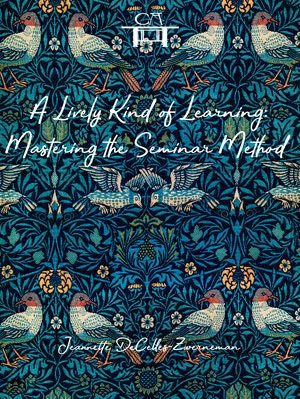A fellow teacher recommended a website to help us as we craft our Seminar class. On that site I discovered
A Lively Kind of Learning: Mastering the Seminar Method by Jennette DeCelles-Zwerneman. It turned out to be a very helpful book. I recommended that our entire team read the short treatise and discuss a la "book club"!
I found several worthy gems: "The goals of the seminar are to teach the following skills and habits of mind: how to read well with sensitivity to genre; how to speak precisely in a spirited, adult conversation marked by wonder and rigor; how to defend their positions and gracefully change their minds when necessary; how to think through a thorny problem from beginning to end with precision; and how to think about the world more generally." (p. 5)
Something to reflect on: "Another more sober complaint against conducting seminars with high school students is that it invites arrogance in young people who enjoy minimal experience of the world and who are already prone to sophomoric pronouncements. (p. 6)
The goal: "If a seminar discussion is successful, the students should know that they have learned something at its conclusion." (p. 8)
Questions to ask: "Why do you say that? What do you mean by that? Where is that in the text?
Can you expand on that? How can you maintain that reading in light of this other passage? You are now contradicting what you said before; did you mean to do that? What would we have to assume to believe what you're saying is true?" (p. 9)
A call to center the text: "Seminar leaders should always begin with the concrete text before them. The rest will follow naturally. The students should know that the text is the source of their discussion and that they should not be consulting outside sources." (p. 20)
A word of advice on what to do; "When sorting through philosophical texts, an exceptionally useful habit to acquire is the practice of distilling arguments on a one-half sheet of paper in outline form. Restricting oneself this way has the effect of clarifying the issues and disciplining the mind." (p. 28)
The author outlines "Six Patterns for Leading Seminar":
- Recreate the drama, collect the questions. "Learning to ask good questions is an important intellectual skill that should be acquired in seminar training." (p. 36)
- Arguments: Find them first than evaluate. "The students are directed to locate the thesis of an argu-ment, the argument's logical construction, and the evidence offered by the interlocutor for that position." (p. 36)
- Two by Two. "In this pattern, the students are working together, building a shared experience of the text. They are seeing it through the eyes of their colleagues, and they are seeing afresh what they had missed on their own." (p. 40)
- Line by line. "We are trying to teach the students how to read, and that involves occasions of close, detailed investigation of the text." (p. 44)
- Competing Essays. "The fifth kind of seminar discussion is based on two competing essays written by the students themselves...The essay assignment would have to solicit opposing but arguable positions." (p. 49)
- The Big Picture. "It involves comparing and contrasting assessments of various authors on a variety of overlapping concerns an interests." (p. 50)
Finally the book ends with "Common Mistakes that Spoil a Seminar."
The Expert: "[T]hey fear the unruly and often unpredictable nature of the seminar. They are frightened when students start interrupting each other. Because they fear the seemingly gigantic pauses that sometimes open up in these conversations, they fill them, instead of patiently waiting for the students to catch up...If the seminar leader plays the Expert long enough, the students will catch on and wait for him to settle the debate..."(p. 57)
The Traffic Cop: "They believe their purpose is to stay out of the way and keep the traffic moving by calling on students to speak; directing traffic by quieting interruptions and ticketing malcontents; and waving travelers through the intersection by cueing up the next remark." (p. 60)
The best Seminar teacher functions as an "Experienced Mountain Guide."The skillful teacher needs to be intellectually alive, energetic, and opportunistic. When the students move the conversation into unexpected territory, and the issues arising are potentially fruitful, the teacher needs to guide that conversation and move in the fresh direction suggested by the students' questions and remarks." (p. 61)
And finally, my biggest takeaway: "One of the most important skills students gain in these discussions is learning how to engage each other, not just the teacher, in a lengthy and substantive exchange. It is imperative that the students be consistently redirected to address one another in these conversations." (p. 76)
In true Seminar fashion, the author details the Final Cause of Seminar: "We want them to become reflective, rigorous, intellectually honest, spiritually sensitive, and competent readers of a wide and various selection of genres. The seminar should cultivate in the students the ability to think through problems independently, collaboratively, and imaginatively; to scrutinize arguments and evaluate the truth of those ar-guments; to imaginatively observe and reflect on the created world in a piece of literature and the development and motivation of the characters who inhabit that world; and to be genuinely moved by the beauty and the suffering they confront in their reading. Finally, the students should acquire an understanding of the world and their place in it." (p. 89)





